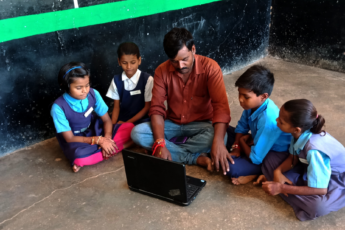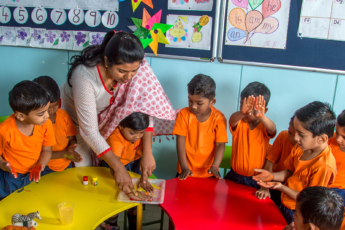Social Skills for School: Making Friends and Building Relationships
Implementing social skills can be challenging for children. It’s not something that comes naturally to everyone, and it takes a whole lot of practice and hard work to get the hang of it. While some children pick up these skills naturally, others might find certain aspects tougher. If you notice that your little one is having difficulty making friends or getting along with others, take a step back and observe what’s happening. Think about possible factors like starting a new school jitter, being a bit on the shy side, or maybe even dealing with teasing from other kids. By considering these things, you can better help your child tackle their social challenges.
The learning loss survey showed that 58% of teachers feel students’ social skills suffered due to Covid-related school closures, leading to shorter attention spans and distractions. Thus, it’s vital to help children develop their social skills now more than ever. With some good old parental guidance, kids can conquer the social pressures of school, level up their social skills, and build some seriously awesome relationships along the way.
🤝The Importance of Social Skills in School
Kids also need to be able to express themselves clearly and effectively so that others can understand what they’re saying. This includes being able to share information about themselves and their interests without feeling self-conscious or embarrassed about what they’re talking about. It also means being able to read other people’s facial expressions and body language to better understand what they’re trying to communicate.
Before diving into the tips, let’s first understand why social skills are so crucial for children in school. Building social skills helps children:
- Feel more confident and secure in their school environment
- Foster a sense of belonging and acceptance among peers
- Enhance their communication and problem-solving abilities
- Build resilience and cope better with challenges or setbacks
- Improve their overall academic performance and future career prospects
Making friends and building relationships is a challenge for many kids, often because they feel intimidated by the social expectations of school. However, socializing in a positive way doesn’t have to be complicated or intimidating – it can be accomplished with a few simple strategies.
🤝Encourage Active Listening
Listening is a crucial social skill that lays the foundation for effective communication. Teach your child the importance of active listening by giving their full attention to the speaker, making eye contact, and showing empathy. This will help them better understand others’ feelings and perspectives, making it easier to build connections and friendships.
🤝Practice Good Manners
Good manners go a long way in creating a positive impression on others. Encourage your child to say “please,” “thank you,” and “excuse me” in their daily interactions. Teach them the importance of respecting others’ personal space, waiting their turn, and sharing. These simple acts of courtesy will make your child more approachable and likable among their peers.
🤝Teach Empathy and Compassion
Empathy and compassion are key ingredients for building solid relationships. Teach your child to put themselves in others’ shoes and understand their feelings. Encourage them to offer help and support to classmates who may be struggling or facing challenges. Your child will naturally attract positive relationships by being a caring and empathetic friend.
🤝Promote Positive Body Language
Non-verbal cues play a significant role in communicating and connecting with others. Teach your child the importance of positive body language, such as maintaining eye contact, smiling, and having an open posture. This will make them appear more approachable and friendly, helping them attract new friends and build relationships.
🤝Encourage Participation in Group Activities
Participating in group activities, such as sports, clubs, or after-school programs, provides an excellent opportunity for your child to meet new friends with similar interests. Encourage your child to join activities they enjoy and actively engage with their peers. This will not only help them develop new skills but also foster a sense of belonging and harmony.
🤝Develop Conversation Skills
Being able to initiate and maintain a conversation is essential for making friends. Help your child develop their conversation skills by practicing open-ended questions, showing genuine interest in others, and sharing their experiences. Role-playing different social scenarios at home can also be a fun way to practice these skills and build your child’s confidence.
🤝Foster Resilience and Conflict Resolution
Conflicts and disagreements are a natural part of any relationship. Teach your child the importance of staying calm and composed during conflicts and finding constructive solutions to problems. Encourage them to apologize and forgive when necessary, and help them understand that it’s okay to agree to disagree sometimes. Building resilience and conflict resolution skills will help your child navigate challenging social situations and maintain strong relationships.
🤝Be a Positive Role Model
Children learn a lot from observing their parents and caregivers. Be a positive role model by demonstrating healthy social skills, such as active listening, empathy, and effective communication. Show your child the importance of maintaining strong relationships with friends, family, and colleagues, and they will likely follow your example.
Final Thoughts
Helping your child with strong social skill development is an ongoing process that requires patience, guidance, and encouragement. Using these tips and strategies, you can support your child in making friends and building lasting relationships in school. Remember, every child is unique, and it’s essential to be patient and understanding as they navigate their social journey. They’ll grow into confident, compassionate, and socially adept individuals with your love and support.
Square Panda India’s comprehensive programs go beyond teaching basic academic skills. They also emphasize the importance of social skills and provide children with the necessary tools to understand and develop them. By incorporating interactive activities and engaging content, we aim to empower children to navigate social interactions with confidence and empathy.




Leave a Comment